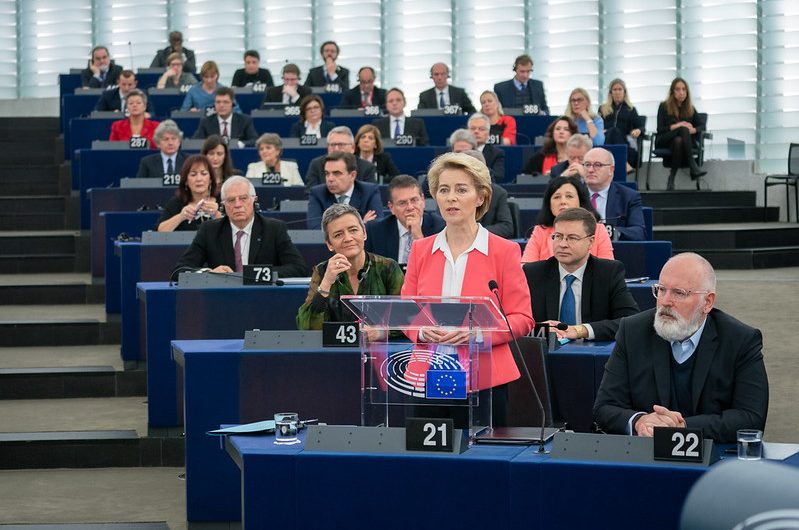
European Parliament via Flickr
The Good, the Bad, and the Unknown of EU “Technological Sovereignty”

Peter S. Rashish
Vice President; Director, Geoeconomics Program
Peter S. Rashish, who counts over 30 years of experience counseling corporations, think tanks, foundations, and international organizations on transatlantic trade and economic strategy, is Vice President and Director of the Geoeconomics Program at AICGS. He also writes The Wider Atlantic blog.
Mr. Rashish has served as Vice President for Europe and Eurasia at the U.S. Chamber of Commerce, where he spearheaded the Chamber’s advocacy ahead of the launch of the Transatlantic Trade and Investment Partnership. Previously, Mr. Rashish was a Senior Advisor for Europe at McLarty Associates, Executive Vice President of the European Institute, and a staff member and consultant at the International Energy Agency, the World Bank, UNCTAD, the Atlantic Council, the Bertelsmann Foundation, and the German Marshall Fund.
Mr. Rashish has testified before the House Financial Services Subcommittee on International Monetary Policy and Trade and the House Foreign Affairs Subcommittee on Europe and Eurasia and has advised three U.S. presidential campaigns. He has been a featured speaker at the Munich Security Conference, the Aspen Ideas Festival, and the Salzburg Global Seminar and is a member of the Board of Directors of the Jean Monnet Institute in Paris and a Senior Advisor to the European Policy Centre in Brussels. His commentaries have been published in The New York Times, the Financial Times, The Wall Street Journal, Foreign Policy, and The National Interest, and he has appeared on PBS, CNBC, CNN, NPR, and the BBC.
He earned a BA from Harvard College and an MPhil in international relations from Oxford University. He speaks French, German, Italian, and Spanish.
Shortly before taking the helm of the European Commission in November 2019, Ursula von der Leyen announced that under her presidency the institution would carry a “geopolitical” brand. By integrating all the economic, regulatory, and diplomatic tools at its command the EU would be able to hold its own in a world of weakening global rules and increasing rivalry between the United States and China.
With yesterday’s twin release of the Commission’s data strategy and more pinpointed artificial intelligence white paper, what this ambition entails is beginning to come into view.
The Commission’s guiding principle isn’t hard to identify. According to Ursula von der Leyen, the EU requires technological sovereignty.
The Commission’s guiding principle isn’t hard to identify. According to von der Leyen, the EU requires technological sovereignty: “the capability that Europe must have to make its own choices, based on its own values, respecting its own rules.” After missing out on the first wave of the data revolution centered on business-to-consumer (Facebook, Amazon) and customer-to-customer (eBay, Etsy) platforms dominated by U.S. and Chinese firms, the EU wants to be a co-equal in the next wave of business-to-business platforms enabled by AI.
The Commission appears to be wagering that if it can become the regulatory first mover in AI, it will help Europe—a leader in advanced manufacturing and in research on industrial applications of AI—to make the most of its natural technological endowment. The EU’s General Data Protection Regulation covering data privacy went into effect 20 years after Google’s search engine came online—too late to impact real economy developments. The Commission doesn’t want to repeat that history with AI.
The Commission’s AI paper contains much that is good, some that is less so, and leaves some questions unanswered.
First the good. The emphasis on human-centered AI, on avoiding fragmentation within the single market (the EU’s greatest success story for itself and its trading partners), on sector-by-sector rather than one size fits all regulation, on a risk-based rather than a precautionary approach (which aligns it with U.S. principles), and on the need to regulate market access for riskier AI through conformity assessments are all sensible.
Less productive is the way the Commission bemoans that “EU-based cloud providers have only a small share of the cloud market,” making it “highly dependent on external providers, vulnerable to external data threats and subject to a loss of investment potential for the European digital industry.” This line of thinking suggests that tech sovereignty is not only about being a rule maker (rather than a rule taker) and influencing market developments that way, but also about a more hands-on (and uncertain) EU industrial policy.
One important unknown in the Commission’s strategy is the role of international cooperation. The EU seems focused on getting the regulatory framework right for its own market, less on the value of engaging allies.
But if the EU wants to ensure that China’s state-centered approach to AI—the antithesis of the EU’s human and ethically-based AI—does not become dominant, then working with the United States would help. And at least for now, the White House’s thinking about AI regulation seems generally compatible with the EU’s own.
The exercise of sovereignty (technological or otherwise) can be consistent with—and indeed reinforced by—cooperation with like-minded partners.
One potential way forward lies in the EU’s mooting of signing mutual recognition agreements (MRAs) with countries that wish to enter the EU single market for AI (and which would also apply in the other direction). Since July 2018 the United States and the EU have been in talks designed to streamline various industrial product approvals in each other’s market through just such MRAs.
A U.S.-EU agreement to consult with each other as they plan and adopt their respective regulatory regimes for AI and to harmonize those regimes where possible would deliver an important lesson to American and European publics: that the exercise of sovereignty (technological or otherwise) can be consistent with—and indeed reinforced by—cooperation with like-minded partners.









